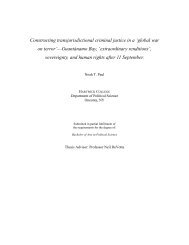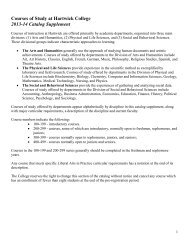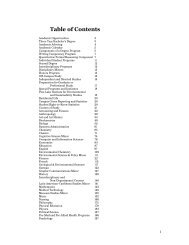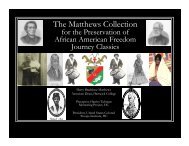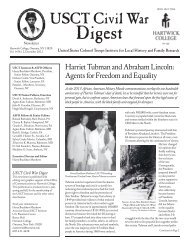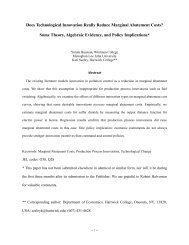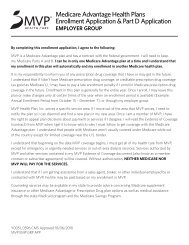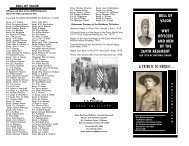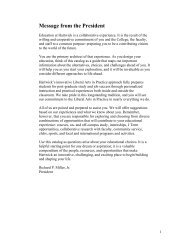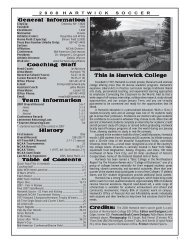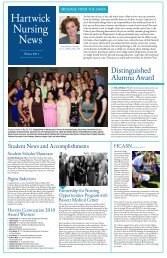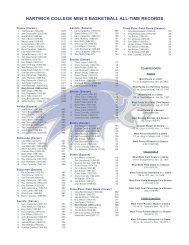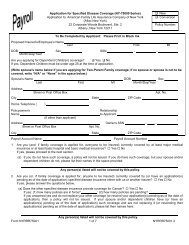Table of Contents - Hartwick College
Table of Contents - Hartwick College
Table of Contents - Hartwick College
Create successful ePaper yourself
Turn your PDF publications into a flip-book with our unique Google optimized e-Paper software.
generally prepared to represent the assigned country or countries.<br />
Prerequisite: permission <strong>of</strong> instructor.<br />
305 Comparative Foreign Policy (3 credits) An examination <strong>of</strong> foreign<br />
policies and policy decision making <strong>of</strong> major world or regional actors, including<br />
an examination <strong>of</strong> the historical dynamics influencing policy making, the systemlevel<br />
(global) sources facilitating states’ strategic opportunities and constraints,<br />
and the domestic factors shaping foreign policies in these countries. From a<br />
comparative standpoint, the course evaluates foreign policy decision making with<br />
regard to each country’s regional imperatives and standing in the world, their<br />
foreign policy formulation vis-a-vis each other, and their relations with the<br />
world’s most dominant power, the United States. Examples <strong>of</strong> states likely to be<br />
included: China, Russia, India, Brazil, Egypt, Germany, Israel, South Africa.<br />
PR: Posc 205, or permission <strong>of</strong> instructor. Typically <strong>of</strong>fered alternate years.<br />
(SBA) or (NTW)<br />
335 International Law (3 credits) An introduction to the role <strong>of</strong> public<br />
international law, including an evaluation <strong>of</strong> both historical and<br />
contemporary perspectives on the operation <strong>of</strong> international law, the<br />
nature and sources if international law, the rights and obligations <strong>of</strong> states<br />
(including why states and non-state actors comply with and violate<br />
international law), and issues dealing with sovereignty, international<br />
treaties, territoriality, and international adjudications. It also will<br />
examine how international law applies to the use <strong>of</strong> force and human<br />
rights and also seek to understand the role international law plays in U.S.<br />
foreign policy. Prerequisite: Posc 105 or permission <strong>of</strong> instructor. (SBA)<br />
345 Seminar: Global Issues, Global Crises (3 credits) This course<br />
examines crisis-level issues in global affairs and analyzes private (nongovernmental)<br />
and public responses to them at both the national and<br />
international levels. Study <strong>of</strong> crisis-precipitating factors will be followed<br />
by more intense focus on state and non-state actors involved in<br />
addressing crises and shaping policy responses. How actors and groups<br />
interact, cooperate, or compete, and pursue their own interests as they<br />
respond to crises will be explored. Actors studied will include: IGOs (such<br />
as the UN, or regional trade organizations), NGOs (such as the Red Cross,<br />
Doctors Without Borders, Human Rights Watch, or local micro-credit<br />
organizations), and international financial institutions (such as the IMF<br />
or the World Bank). A consideration <strong>of</strong> lingering dilemmas and challenges<br />
will accompany discussions <strong>of</strong> lessons learned from the politics <strong>of</strong> crisis<br />
response. Example issues include: refugees and refugee warehousing,<br />
massive-impact natural disasters, global terrorism, failed states and postconflict<br />
nation-building, trafficking in children, child workers and child<br />
soldiers, and comparative immigration policies. Prerequisite: Posc 105<br />
and a 200-level Comparative Politics or International Politics course, or,<br />
permission <strong>of</strong> instructor. Typically <strong>of</strong>fered alternate years. (SBA) or<br />
(NTW)<br />
365 International Political Economy (3 credits) This course<br />
examines the struggle and cooperation that is the realm <strong>of</strong> international<br />
political economy, using history and theory to illuminate policy and<br />
organization. Study begins with consideration <strong>of</strong> the U.S. in the global<br />
economy. Topics include: determinants <strong>of</strong> states’ foreign economic policy,<br />
the politics <strong>of</strong> bilateral trade, multilateral trade regimes, food politics,<br />
labor dynamics and global finance. The tensions between global<br />
208



